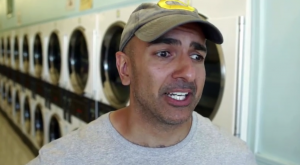Kashkari draws a media crowd
by James Poulos | October 9, 2014 10:39 am
 Neel Kashkari, Gov. Jerry Brown’s Republican challenger, has been playing a long game.
Neel Kashkari, Gov. Jerry Brown’s Republican challenger, has been playing a long game.
That hasn’t been immediately evident from the frenetic activity surrounding his final month of campaigning. Using a string of concept-driven political stunts, ranging from free prizes[1] to a masquerade as a homeless man, Kashkari has established a reputation for putting elbow grease into his run for governor.
Yet into the active effort and strident rhetoric Kashkari has added a relatively tongue-in-cheek approach to the uphill run before him. Unusual for a Republican trying to make a name in other states — but not so out of place in California — the combination of smarts, sarcasm and street hustle has inspired the media, if not Democrats, to take a closer look.
A new brand
Interest has swirled around whether Kashkari plausibly can portray a character that many have referenced but few have embodied — a “different kind of Republican,” as The Economist put[2] it. Over the summer, some conservative stalwarts began to notice Kashkari’s recipe for change involved scrambling old battle lines, not simply moving to the progressive left or the pro-corporate center.
In a column hailing Kashkari, George Will depicted[3] him as the heir to Barry Goldwater, who in 1964 famously lost in a landslide to President Lyndon Johnson — yet inspired a conservative movement that elected Ronald Reagan president in 1980. “If California becomes a purple state and Democrats can no longer assume its 20 percent of 270 electoral votes, Republicans nationwide will be indebted to the immigrants’ son who plucked up Goldwater’s banner of conservatism with a Western libertarian flavor.”
Goldwater turned his electoral blowout into an opportunity to shift the national Republican Party. Kashkari’s underdog status has afforded a similar opportunity — and the political press has picked up on the strategy. Rather than offering the media a retread of tales of California Republicans’ past, Kashkari has presented a surprising spectacle. Wealthy political novices from business backgrounds, such as Carly Fiorina and Meg Whitman, have tried to unseat top-tier Democrats before. They failed — leading national political journalists to question why the state GOP was willing to tolerate such a bad investment.
Kashkari, who is not personally short on cash, has raised[4] a far more modest campaign chest. But his small budget has become a buzz-building advantage. Not only has it fueled the kind of stunt-driven campaigning that grabs headlines, it has given state Republicans a feeling that neither donors nor the party have thrown good money after bad. And it has changed the media narrative, differentiating Kashkari from the political losers who have come before him.
The shift hasn’t necessarily played well with Kashkari’s natural allies across the country — Republicans close to Wall Street. After hitting the stump for him in early summer, New Jersey Gov. Chris Christie couldn’t[5] find time to share the state with Kashkari in the election season’s final weeks. Rather than a personal slight, however, the decision was strictly business: Christie was dispatched by the Republican Governors Association to help put well-positioned candidates over the top.
West coast credentials
The absence of monied East Coast support isn’t really a disadvantage for Kashkari. Earlier in his primary campaign, he had to shake his political association with the Troubled Asset Relief Program, or TARP — the massive 2008 bailout program he was instrumental in designing and implementing under President George W. Bush. Kashkari seems to have determined that the West Coast — not Wall Street or his home state of Ohio — is the most hospitable territory for his brand of Republicanism.
Indeed, the swell of attention surrounding his approach has led some observers to suggest Kashkari could emerge from even a losing campaign as a powerful force in California Republican politics. Asked by the Santa Monica Mirror if he would consider a race for Senate in the years to come, Kashkari was blunt. “In all honesty, I’ve never ruled out any of those opportunities,” he said. Although, he added, he was “100 percent focused on November,” Mirror columnist Tom Elias placed his bet “on Kashkari starting right in on his next effort.”
And whereas he’s running against an incumbent this year, the next California U.S. Senate race is for the seat of Democratic Sen. Barbara Boxer in 2016. Last month the Chronicle reported[6]:
“Sen. Barbara Boxer says she has yet to make up her mind about seeking a fifth term in 2016, but there’s no shortage of signs that the Democrat may be opting out.
“It’s not just that she has less than $200,000 in her campaign account, compared with $3.5 million at this stage before her last election fight. Some comments from those who know the 73-year-old senator are also telling.
“‘She is not running for re-election,’ said one longtime Democratic fundraiser with deep ties to Boxer, who spoke only on background.”
Of course, she still might run. But if she retires, the open field, combined with Kashkari’s experience with this year’s campaign, could give him a big leg up in 2016.
- free prizes: http://www.huffingtonpost.com/2014/10/08/neel-kashkari-gift-cards-scholarships_n_5949452.html?utm_hp_ref=money&ir=Money
- put: http://www.economist.com/news/united-states/21616962-neel-kashkari-will-not-unseat-californias-democratic-governor-he-may-help-his-party
- depicted: http://www.washingtonpost.com/opinions/george-will-neel-kashkari-gop-candidate-in-california-has-agenda-similar-to-goldwaters/2014/07/23/65464542-11d0-11e4-8936-26932bcfd6ed_story.html
- raised: http://www.latimes.com/local/political/la-me-pc-kashkari-fundraising-falls-short-of-goal-20141006-story.html
- couldn’t: http://www.latimes.com/local/political/la-me-pc-christie-kashkari-20141001-story.html
- reported: http://www.sfgate.com/bayarea/matier-ross/article/Barbara-Boxer-re-election-run-looking-unlikely-5738787.php
Source URL: https://calwatchdog.com/2014/10/09/kashkari-draws-a-media-crowd/